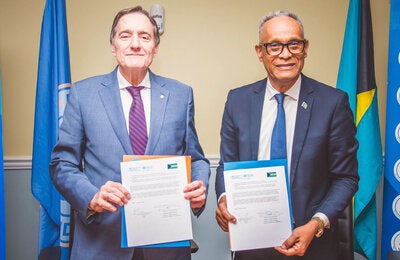Geneva, Switzerland, 25 January 2015 (PAHO/WHO) — The Ebola outbreak in West Africa is an opportunity to strengthen outbreak alert and response within countries and to improve international coordination and preparedness for future outbreaks, said a group of countries from the Americas yesterday at a special briefing on Ebola during the 136th Session of the Executive Board of the World Health Organization (WHO) in Geneva, Switzerland.
Calling the Ebola outbreak an "unprecedented challenge," the countries urged the international community to examine lessons from the outbreak and continue its engagement, commitment and adaptation going forward. They also pointed to the importance of making health systems stronger in general, to ensure they are better able to respond to any health crisis.
"True preparedness does not stem solely from contingency plans but needs to be firmly imbedded in robust national health systems, a trained health workforce, and a supportive network of regional and global partners capable of coordinating efforts and channeling sufficient resources to act timely in the event of an outbreak of a scale similar to Ebola," the countries said in a consensus statement.
Unlike North America, no country in Latin America or the Caribbean has to date reported imported cases of Ebola, but the possibility of an imported case cannot be discarded. To help countries prepare for this eventuality, the Pan American Health Organization (PAHO), Regional Office for the Americas of WHO, has engaged in technical cooperation to help improve countries' readiness to detect and respond to any imported case. This has included sending expert missions in recent months to more than 25 countries in Latin America and the Caribbean.
In their statement, read by the representative of Colombia, the countries said PAHO's work in this area has been "instrumental at the regional level." They also called on WHO to "sustain and strengthen its leadership and coordinating role in these areas" and urged "long-term decisions leading to a reinforced capacity" for WHO operations.
The group said countries of the Americas have an ethical responsibility to help stop the Ebola epidemic in West Africa, which by 18 January had sickened 21,724 people and claimed 8,641 lives, mostly in Sierra Leone, Liberia and Guinea—the three hardest-hit countries. The countries of the Americas promised to continue supporting the international response to the outbreak in West Africa by providing medical, human, financial and technical resources, as well as through the development of vaccines and medical counter measures.
In addition, the countries pledged to work together to strengthen, harmonize and coordinate regional and national preparedness efforts to be able to respond timely and effectively to any eventual introduction of Ebola virus into the Americas. They noted that efforts to strengthen Ebola preparedness also support the implementation of the International Health Regulations (IHR), which require countries to be able to promptly report and investigate any outbreak or incident that could potentially have an international impact.



